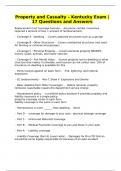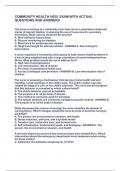How successful were the domestic policies of Edward IV’s second reign?
The domestic policies of Edward IV’s second reign were successful to a large extent given that he
increased the financial stability of the crown through innovating trade and improving systems
previously used such as the Chamber System of Finance. His domestic policy included using men of
ability, such as Hastings, which was very successful, given their continuous loyalty, however, Edward’s
policy of law and order had its faults, as he himself didn’t abide by it and nor did he harshly enforce it,
therefore causing himself issues of opposition, such as Clarence.
Edward’s domestic policy of law and order was not successful as he largely went back on his own
rulings which did not provide a strong, moral leader for society to look up to. He tolerated high levels
of crime, ignoring a lot of corruption within the justice system, which is ironic given that when he
initially came to power in 1461, Edward was determined to enforce law and justice given the failure
of Henry VI. This desire had diminished during his second reign, where he himself took part in
disingenuous activities, for example he allowed the Dukedom of Exeter to pass onto the daughter of
the Duchess (Anne, Edward’s sister) by her second marriage to Thomas St. Leger. In addition, his
younger son, Richard, benefitted unjustly, gaining the Mowbray estates simply because he had been
married to the Mowbray heiress since he was a young boy, therefore ignoring the true heirs and laws
of inheritance in order to increase his family’s estates. This shows his law and order to be unsuccessful
because it would encourage discontent and anger from those whom Edward needed the support of,
now more than ever given his unstable journey. Despite Edward issuing a law against retaining in 1468,
which was to prevent nobles from having their own private retinues which may cause conflict, seen
previously under Henry VI, he didn’t enforce it. This shows that his policy wasn’t successful as he chose
to override it, and his policy continued to not be the harsh one he had initially set out to achieve, given
that he issued lots of pardons and patronage, where some may argue this was a weakness. Edward’s
brother clarence caused issues regarding law and order, and the fact that Edward was so slow in
dealing with his brother only implies it to be unsuccessful. Clarence disrupted Gloucester’s plans of
marriage as he was desperate to receive more land and inheritance than his brother, therefore
kidnapping Anne Neville; accusing one of his late wife Isabelle’s ladies-in-waiting, Ankerette, of
poisoning her in 1476; and defending the innocence of one of his household members of using magic
to foreshadow the king’s death. Edward’s lack of urgency in dealing with Clarence’s actions proved his
domestic policy to be unsuccessful, as he had become too relaxed and as a result, appeared weak and
an easy target to weaken. However, Edward’s policy was successful in some regards as the law of
retaining was largely ignored simply because there was no need for it, as few men were retained
during the 1470s; England was stable so there weren’t many issues with nobles taking private feuds
to the battlefield. Edward was willing to replace those who controlled areas in order for law and order
to be upheld, seen with William Herbert in South Wales who was replaced with the Council of Wales,
to be the centre of administration and the fact it continued under Richard III in the north demonstrates
the policy’s success. Edward faced little rebellion during his second reign, the only notable one being
in 1471 with the Earl of Oxford, capturing St Michael’s Mount but it had ended by the end of the year,
therefore showing that Edward’s domestic policy was successful as there was hardly any discontent
during his second reign – he had succeeded in bringing stability to England which in turn left little need
for harsh measures.
The domestic policies of Edward IV’s second reign were successful to a large extent given that he
increased the financial stability of the crown through innovating trade and improving systems
previously used such as the Chamber System of Finance. His domestic policy included using men of
ability, such as Hastings, which was very successful, given their continuous loyalty, however, Edward’s
policy of law and order had its faults, as he himself didn’t abide by it and nor did he harshly enforce it,
therefore causing himself issues of opposition, such as Clarence.
Edward’s domestic policy of law and order was not successful as he largely went back on his own
rulings which did not provide a strong, moral leader for society to look up to. He tolerated high levels
of crime, ignoring a lot of corruption within the justice system, which is ironic given that when he
initially came to power in 1461, Edward was determined to enforce law and justice given the failure
of Henry VI. This desire had diminished during his second reign, where he himself took part in
disingenuous activities, for example he allowed the Dukedom of Exeter to pass onto the daughter of
the Duchess (Anne, Edward’s sister) by her second marriage to Thomas St. Leger. In addition, his
younger son, Richard, benefitted unjustly, gaining the Mowbray estates simply because he had been
married to the Mowbray heiress since he was a young boy, therefore ignoring the true heirs and laws
of inheritance in order to increase his family’s estates. This shows his law and order to be unsuccessful
because it would encourage discontent and anger from those whom Edward needed the support of,
now more than ever given his unstable journey. Despite Edward issuing a law against retaining in 1468,
which was to prevent nobles from having their own private retinues which may cause conflict, seen
previously under Henry VI, he didn’t enforce it. This shows that his policy wasn’t successful as he chose
to override it, and his policy continued to not be the harsh one he had initially set out to achieve, given
that he issued lots of pardons and patronage, where some may argue this was a weakness. Edward’s
brother clarence caused issues regarding law and order, and the fact that Edward was so slow in
dealing with his brother only implies it to be unsuccessful. Clarence disrupted Gloucester’s plans of
marriage as he was desperate to receive more land and inheritance than his brother, therefore
kidnapping Anne Neville; accusing one of his late wife Isabelle’s ladies-in-waiting, Ankerette, of
poisoning her in 1476; and defending the innocence of one of his household members of using magic
to foreshadow the king’s death. Edward’s lack of urgency in dealing with Clarence’s actions proved his
domestic policy to be unsuccessful, as he had become too relaxed and as a result, appeared weak and
an easy target to weaken. However, Edward’s policy was successful in some regards as the law of
retaining was largely ignored simply because there was no need for it, as few men were retained
during the 1470s; England was stable so there weren’t many issues with nobles taking private feuds
to the battlefield. Edward was willing to replace those who controlled areas in order for law and order
to be upheld, seen with William Herbert in South Wales who was replaced with the Council of Wales,
to be the centre of administration and the fact it continued under Richard III in the north demonstrates
the policy’s success. Edward faced little rebellion during his second reign, the only notable one being
in 1471 with the Earl of Oxford, capturing St Michael’s Mount but it had ended by the end of the year,
therefore showing that Edward’s domestic policy was successful as there was hardly any discontent
during his second reign – he had succeeded in bringing stability to England which in turn left little need
for harsh measures.










